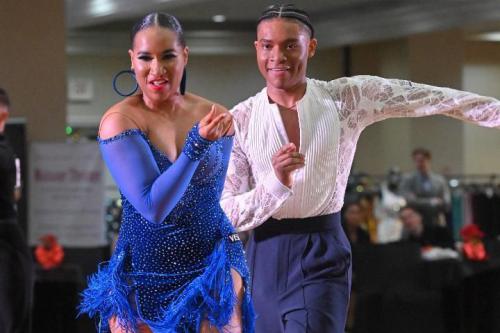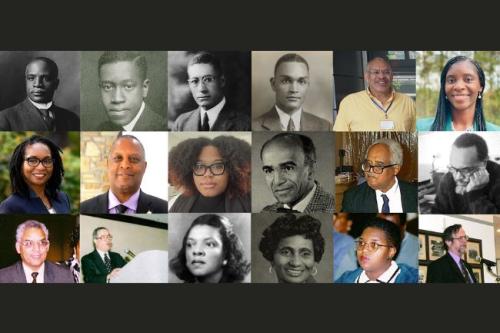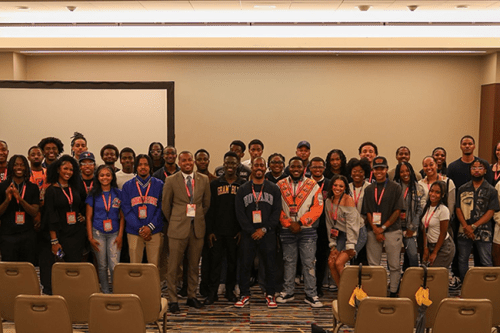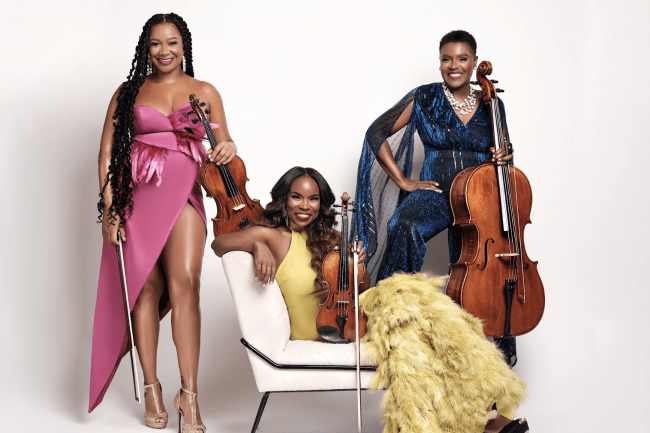Kendall Isadore (Violin HU Alumna), Dawn Johnson (Viola HU Alumna) and Élise Sharp (Cello) - Pictures Courtesy of Voice of America
The marquee is lit with their name, the stage is set, and the crowd is ready to hear a soulful symphony of three at The Birchmere, a legendary music hall in Washington, D.C. It is just another day’s work for the insanely talented group of musicians called the “String Queens,” two of which, Kendall Isadore (B.S., '11) and Elise Sharp, studied at Howard University. Kendall Isadore, is the group's violinist, Sharp plays the cello, and Dawn Johnson is its master of the viola.
Howard has long stood as a beacon for those seeking to push beyond imposed limitations. The String Queens embrace that philosophy, believing that their craft as both an art form and a means of resistance. The ability to play the violin, viola, or cello at a high level in a world that often underestimates Black classical musicians is itself a statement—a declaration that they belong in these spaces.
For the violinists and string players who have walked the halls of Howard University, the institution represents more than a place of learning. It is home to a long and storied musical lineage which continues today. The students and faculty who perform, study, and create there honor the ingenuity and raw talent of ancestors who played banjos and violins on Southern plantations while celebrating the professional classical musicians who have broken barriers in concert halls— paying tribute to the past while shaping the future.
“Howard University is an extremely special place,” said Isadore, “[Howard’s history] continues all the way into a time where Jesse Norman can come on the scene and be a unique opera singer in a Eurocentric landscape, and be the only one. That's important to me,” said Isadore.
The String Queens were recently featured on a 52 Documentary episode called Soulful Strings that captures their journey as performers, educators and groundbreaking trio of Black musicians. Viewers can view the documentary on the Voice of America YouTube channel and hear these musings and blends of classical, yet soulful artistry.
For these powerful ladies, performance and education are inseparable. When they’re not performing on stage they are teaching in local classrooms. Teaching the next generation of string players is more than instruction. It is activism. And in a world that still lacks widespread representation of Black string musicians, being in the classroom means providing visibility and proof that excellence in this field by people of color is not an anomaly, but a tradition.
We have to relate to each other as humans, and not colors and ethnicities."
“We can see each other's color," Sharp said. "We can't hide it, but we have to relate to each other as humans, and not colors and ethnicities. So, I enjoy going on stage, giving them who my heart is.”
The discipline of string performance requires patience, precision, and an intimate understanding of one’s instrument. These women, who have mastered this craft, have had the pleasure of performing for a bevy of luminaries, such as President Barack Obama and Stevie Wonder.
For these three, their instruments carry deep personal meaning and a connection to their heritage. They still play the same instruments that their parents sacrificed to buy for them as children. For the Queens, the instruments are symbols of the support and endurance that made their careers possible, which they hope to pay forward.
The classroom, much like the stage, is also a place of deep connection. Teaching string students is not just about technical proficiency, but also about instilling confidence and artistry. There is joy in watching young musicians grasp the subtleties of their instruments and in witnessing them realize that they, too, can create beauty and meaning through sound.
“Our whole mantra is, 'create musical experiences that inspire diverse audiences to love, hope, feel and imagine,'” they said.
Their mission extends beyond the technical, and they are serious about ensuring that young musicians see themselves reflected in the music they play. Whether introducing students to classical greats or teaching them to play the Beatles and Michael Jackson on the violin, these educators make sure that the next generation knows that their artistry is limitless. On difficult days, they think back to their ancestors, to their mothers who sacrificed for them, and to the generations before them who were denied opportunities to pursue music professionally.
The String Queens play on—not just for themselves, but for all who came before them and all who will come after.
String Queens: Kendall Isadore (Violin HU Alumna), Dawn Johnson (Viola HU Alumna) and Élise Sharp (Cello) - Pictures Courtesy of Voice of America
Keep Reading
-
 Community
CommunityHoward Student Brock Montgomery Sets Sights on Bringing Ballroom Dance to HBCUs
Feb 3, 2026 6 minutes -
 Legacy
LegacyBuilding the Mathematical Mecca: Howard’s Half‑Century of Innovation, Scholarship, and Leadership
Jan 29, 2026 7 minutes -
 News
NewsFICO Invests in the Howard University and PNC Center for Entrepreneurship
Jan 28, 2026 3 minutes
Find More Stories Like This
Are You a Member of the Media?
Our public relations team can connect you with faculty experts and answer questions about Howard University news and events.
Submit a Media Inquiry

